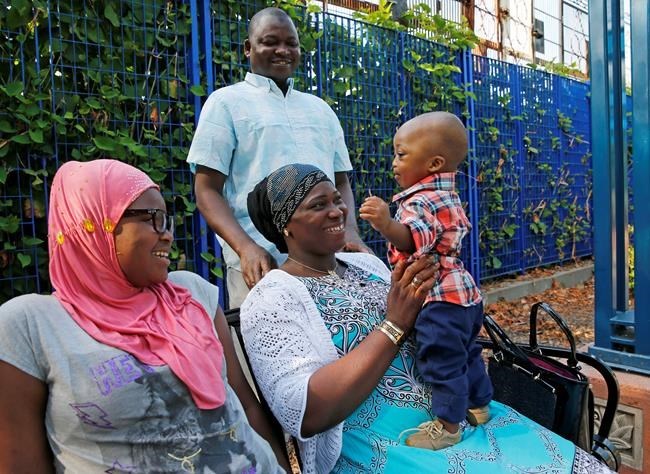
Hatoumata Tounkara, center, a Muslim immigrant from Mali, holds her son Mohamed, as her daughter Fatoumata Dembele and husband Abdoulaye Dembele watch at a park in the Bronx, on June 21, 2016, in New York. Tounkara became a naturalized citizen in a ceremony and is looking forward to voting in the upcoming U.S. presidential election. Thousands of former refugees and asylum seekers will vote in a U.S. election for the first time this November. Many have witnessed the consequences of autocratic rule and civil strife. They’ve spent years navigating the bureaucratic gauntlet needed to get to the U.S. and, eventually, to become a citizen. (AP Photo/Kathy Willens)
August 14, 2016 - 5:15 AM
NEW YORK - The path to the voting booth hasn't been easy for Hatoumata Tounkara, but the former West African refugee says she couldn't have picked a better election to cast her first ballot.
As a newly naturalized American citizen, she's one of thousands of former refugees and asylum-seekers who will be voting in a U.S. election for the first time this November.
"This election is very special to me," Tounkara said. "This can show my daughter that she can become anything she wants in her life, because back home, women just cook and take care of the men."
At 23, Tounkara fled her home in Mali after rejecting an arranged marriage. She made her way to the United States via Gambia in 2008. It took two years for the U.S. to grant her asylum, and then she waited six more for a chance to take the citizenship test.
The road to citizenship is full of challenges for those fleeing oppression and war back home. Many have witnessed the consequences of autocratic rule and civil strife. They've spent years navigating the bureaucracy to get to the U.S. and, eventually, to become a citizen. There are those who believe they hold a personal stake in this election, with immigration becoming a central issue.
As a Muslim, Tounkara says she is put off by some of Donald Trump's rhetoric and will vote for Hillary Clinton. But voting against Trump isn't what is motivating her to vote, said Tounkara, now 31.
"If you don't vote, nobody will hear your voice," she said.
The U.S. government doesn't keep statistics on how many of the over 700,000 immigrants naturalized each year are former refugees or how many of those new citizens register to vote.
Over the past decade, about 150,000 refugees or asylum-seekers on average were granted lawful permanent resident status per year. About 60 per cent of all green cardholders eventually become citizens, according to the Pew Research Center.
While most eligible refugees are excited and eager to participate in democracy, there are many hurdles to active involvement, said Ramla Sahid, executive director of the Partnership for the Advancement of New Americans, a San Diego non-profit group that promotes civic engagement.
Endless paperwork, fees reaching almost $2,000, in-person interviews, fingerprinting, a written 100-question civics test, an English test, and lots of waiting. And still, there are no guarantees. Green cardholders must live in the U.S. for five years before they can become a citizen.
Bandana Rai, 57, who fled Nepal during a 10-year civil war that ended in 2006, said her appreciation of the vote is enhanced by what she went through to become a citizen.
"You have to really want it," Rai said.
Arbey Hamadi, who was born in a camp for Somalian refugees in Kenya, became a U.S. citizen automatically as a teenager when her parents were naturalized in 2012. She is excited to participate in her first election this fall at age 20 — partly because her opposition to Trump, who has proposed a temporary ban on foreign Muslims from entering the U.S.
"As a Muslim, I think we have to stand shoulder to shoulder so that we can amplify our voices and stand against hate," she said.
In areas where there are large concentrations of refugees, they are learning that they can serve as a legitimate political force.
In Minneapolis this past week, Ilhan Omar, a former refugee from Somalia, defeated another Somali refugee, Mohamud Noor, as well as 44-year-incumbent for the Democratic nomination for a seat in the state Legislature.
She is now poised to become the nation's first Somali-American state lawmaker.
Noor, who was naturalized in 2005, said in Somalia there were no elections.
"When you come to a place that you really want to be in, you cherish those democratic ideals that you get to participate in by being a citizen," he said.
News from © The Associated Press, 2016